#003
Health is a basic right
for all people
Rika Fujiya
Japanese Color: KAZOU-iro
#003
Rika Fujiya
Japanese Color: KAZOU-iro
MOVIE

Assitant Professor
Faculty of Nursing and Medical Care
Assistant Professor Rika Fujiya is involved in community health activities in cooperation with NGOs and other organizations in the occupied Palestinian territory, where war never ceases, as well as other developing countries and areas of conflict around the world.
Her aim is to work together with local residents on practical and research work, and at the same time, pass on her wealth of experience and knowledge to youths of future generations.
She also seeks to put the philosophies of health and human rights established in the Declaration of Alma-Ata into practice.
The research activities undertaken by Prof. Fujiya are the establishment and practice of primary health care that will become the core of global health, which will become increasingly important in the future.
My research theme is primary health care (PHC). PHC was defined in accordance with the Declaration of Alma-Ata, drawn up at a joint meeting of the World Health Organization (WHO) and the United Nations Children’s Fund (UNICEF) held in Kazakhstan in Central Asia in September 1978. Specifically, it makes health and medical care more accessible across the world, and is a philosophy and methodology that aims to bring about the realization of improvements in access, fairness, community involvement, and focus on preventive activities in the field of health and medical care worldwide.
The stance of PHC is based on 4 principles: 1. Respect for the needs of people; 2. Community participation; 3. Utilization of community resources; and, 4. Having the community play an active role in developing a comprehensive health care system. The Declaration of Alma-Ata laid out the goal of achieving “Health for all by 2000.” I believe that the fundamental ideology behind that is “non‐acceptance for health inequities.”
Regrettably, the specific goals established by the Declaration of Alma-Ata were not achieved by 2000. However, reflecting on that failure and based on the stance of PHC, efforts were made after 2000 to put in place preventive measures for infectious diseases and improve maternal and child health with the aim of reducing the mortality rate of infants and expectant mothers on the global level. In this regard, a certain level of results was achieved in the Southeast Asia region, for example.
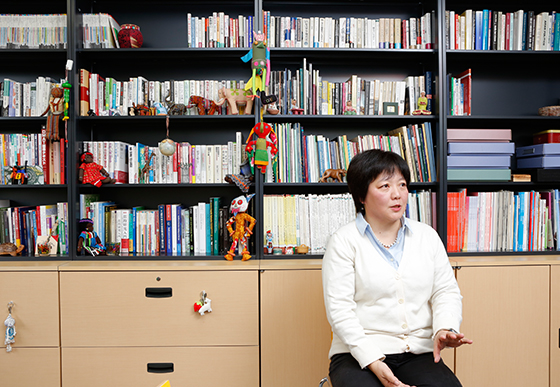
After 2000, the concept of “global health” has been propounded. This concept captures, in an integrated manner, health issues in areas such as public health and maternal and child health on a global scale, across national boundaries. I believe that PHC, based on the philosophy of achieving “health for all,” as established under the Declaration of Alma-Ata, should form the basis for this concept.
It is also a theme that places the focus on health and human rights alongside with PHC, and I would like to consider this concept together with researchers in developing countries while harnessing my experience of previous involvement in community health. The question of how the term “human rights” should be captured is a difficult one to answer, but health is fundamentally a basic human right. However, this human right is not protected in areas of conflict, and children who are born in areas of conflict cannot naturally enjoy good health. I feel that this is extremely absurd.
When I speak to high school students living in areas of conflict or occupied territories, I find that they are highly sensitive to the fact that basic human rights, including the right to health, should be protected regardless of the country or region that a person lives in, even if that country or region were in conflict or under occupation. They also have good knowledge of the Geneva Conventions (International Humanitarian Law). This is an important concept that those of us living in societies where peace is taken for granted tend to forget, and I intend to pursue and think seriously about the fact that human beings are born to this world with health and human rights.
In my practical and research work in the field of PHC, my longest period of involvement has been in the occupied Palestinian territory. In my current position as a health advisor with the Japan International Volunteer Center (JVC), I am involved in projects in East Jerusalem and the Gaza Strip. Students from SFC are also participating in these projects as a part of their research and practice.
In East Jerusalem, JVC provides medical examinations at school and health education in regions that have become divided by “the wall” constructed by Israel. Of these projects, I am involved in Training of Trainers (ToT), which seeks to nurture leaders who can play an active role in health education in the local community. In cooperation with medical NGOs(*) that have been active in the local community for the past 30 years, we implement educational courses spanning about 20 sessions for students in the health committees at schools, and I provide expert advice on how to make health education proceed more smoothly, and the type of challenges that are faced in the provision of such education. Activities by the local staff are beginning to take root and become established, and our concerns are gradually shifting toward the sustainability of the activities.
Strict restrictions pertaining to the movement of people and goods have been enforced in the Gaza Strip, due to blockades and military attacks by Israel. As a result, there are concerns about malnutrition and anemia among children, as well as the adverse impact on their long-term development. JVC has implemented projects aimed at improving the nutrition of children. Until 2011, the focus of these projects was placed on nutrition education and the provision of locally produced high-iron milk and nutritious biscuits to children in kindergartens. However, they have made the transition to educational activities and the nurturing of leaders who can play an active role in nutrition activities in the region. Since 2002, I have been involved in such support activities.
* Non-governmental Organization
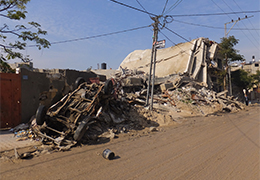
A building in the Gaza Strip, which came under military attacks in the summer of 2014. While the photograph was taken in January 2015, half a year after the attacks took place, no progress has been made on reconstruction due to limitations in procuring resources from outside of Gaza.
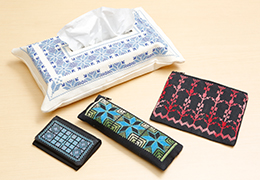
Pieces of traditional embroidery handmade by women from Palestine. Developing and selling these products generates income for women suffering under the economic crisis resulting from the conflict.
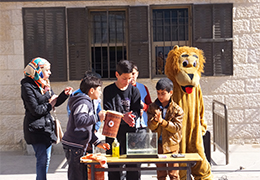
The scene of a health lesson for lower grade children at an elementary school in East Jerusalem, conducted by children from the Health Committee. In such ways, support is provided for creating an environment that allows for health education to be carried out in schools.
In my position as a university faculty member who is engaged in the research and education of PHC, I am involved in activities in the Democratic Republic of Congo in Africa, as well as in the Lao People’s Democratic Republic in Southeast Asia.
The Democratic Republic of Congo Acadex Project is a joint research project that covers the 3 areas of education, architecture, and medicine. Its activities include providing medical examinations at ACADEX Elementary School, providing health education through workshops, and grasping the situation of health in the region. In the workshops, for example, health education that places the emphasis on methods with visual appeal is implemented mainly by students, in order to consider issues together with children from different linguistic and cultural backgrounds, and to encourage the proactive participation of children. In activities to grasp the situation of the community, research is conducted particularly on the water and hygiene situation in view of the fact that water supply has become available to villages.
The Laos Primary Health Care Activity Project is organized as a joint training program for 3 medical faculties (School of Medicine, Faculty of Nursing and Medical Care, Faculty of Pharmacy). Under this project, students observe and undergo practical training in health projects, in order to learn about the roles and activities of WHO, UNICEF, JICA(*) and other international cooperation entities that are active in Laos. Students stay overnight in local villages and provide health education for children at local elementary schools corresponding to their ages, in areas such as first aid, nutrition, and hand hygiene.
* Japan International Cooperation Agency
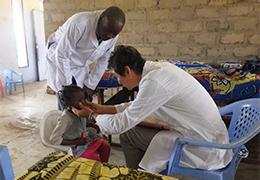
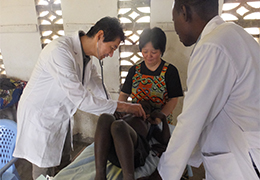
Medical examinations are implemented for children at elementary schools as part of the activities undertaken by the medical team. The doctors, led by professors from School of Medicine, Keio University, provide medical examination services in cooperation with local doctors.
Through the education, research, and practice of PHC, I have come to think that “health is a basic right for all people, and health inequities are not to be accepted.” In order to eliminate such disparities, it is not only vital to put PHC into practice, but also to improve academic research skills and publish the results as academic papers.
However, as most of the regions for the implementation of PHC are areas of developing countries or conflict areas, there are countless challenges when it comes to continuing support amidst the harsh and politically fluid environment, and publishing the research results based on evidence.
For example, ToT activities in East Jerusalem are highly appraised by the local community and have contributed to the significant growth of participants. However, as of the current point when model schools have been established, the number of schools implementing such activities stands at less than 10, which is still inadequate for conducting research by using quantitative research methods and providing scientific evidence. Furthermore, projects aimed at improving the nutrition of children in Gaza have also been confronted with problems such as the development potential and sustainability of the projects, and procurement of funds, arising from the fact that these activities are being carried out in areas suffering from prolonged periods of conflict. It is the local staff who are working to keep up these activities steadily even amidst such circumstances, and putting PHC into actual practice.
In the future, I hope to continue practice and research in order to pursue the ideal academic stance of PHC, and at the same time, overcome various challenges and create something together with people in the local community.
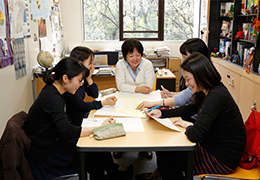
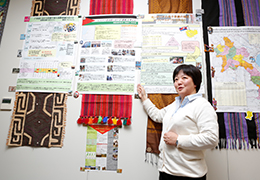
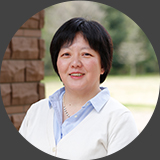
Rika Fujiya
Assistant Professor, Faculty of Nursing and Medical Care, Keio University. Completed doctoral course in the School of International Health/ Global Health Science, Graduate School of Medicine, the University of Tokyo. After working as a public health nurse at Hiroshima City Hall for 4 years, in 1995, joined mother and child health projects in Palestine organized by NGOs until 2002. Coordinated the emergency response of Japan International Volunteer Center (JVC) in Palestine in 2002, then a program coordinator of JVC Palestine 2004-2006 and a program officer of JVC Tokyo office until 2011. Has been her current position since 2011. Currently involved in activities to maintain health at areas of conflict as a health advisor with JVC. Specializes in primary health care, global health, and health & human rights.
